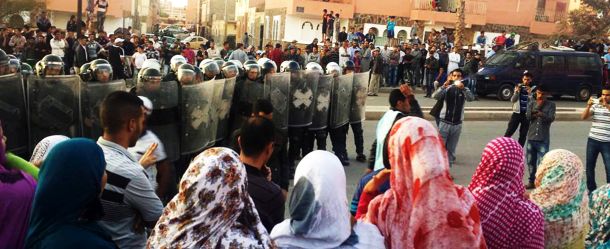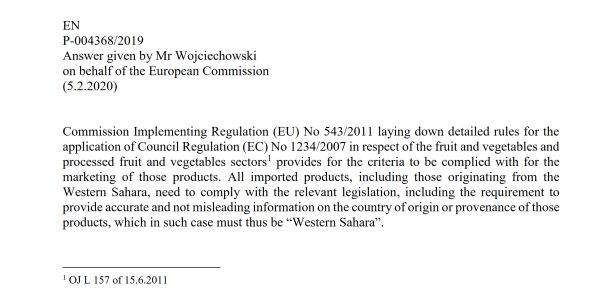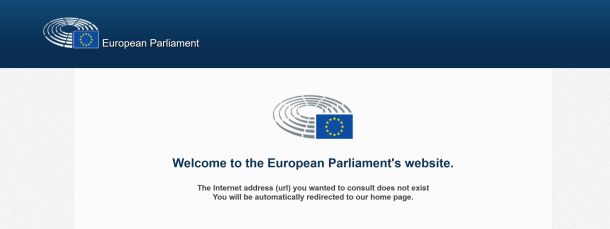
En décembre 2016, la plus haute Cour de l'UE a statué qu'aucun accord de commerce ou d'association de l'UE avec le Maroc ne pouvait être appliqué au Sahara Occidental et que les habitants du territoire doivent consentir à tout accord qui les concerne. Mais l'Union souhaite continuer à importer des produits du Sahara Occidental et poursuit actuellement des pourparlers avec le Maroc, ignorant ainsi complètement l'essence même de la décision de la Cour : Le Sahara Occidental est "un territoire séparé et distinct".
Les organisations sahraouies du territoire occupé et des camps de réfugiés en Algérie ont écrit une lettre aux ministres des affaires étrangères des États membres de l'UE et à la représentante des Affaires étrangères de l'UE, Federica Mogherini, demandant à l'UE de "cesser ses tentatives de contournement de la décision de la Cour de justice, et de se concentrer plutôt sur des actions qui soutiendront le peuple sahraoui dans notre but légitime : autodétermination et démocratie".
Foreign Ministers of the European Union
Federica Mogherini, High Representative for Foreign and Security Policy,
29 August 2017
Your Excellencies,
We write to you as representatives of Saharawi civil society in response to recent EU attempts to amend its trade agreement with Morocco underpinned by the illegal exploitation of natural resources of Western Sahara, and to dispel
the myth that this exploitation benefits the local Saharawi population. This process has taken place entirely in the absence of any consultation with Saharawi voices. As representatives of Saharawi civil society organizations based in the occupied Territory of Western Sahara and the refugee camps in the Southwest Algerian desert, we call on the EU to cease all trade talks with the occupying power, Morocco, regarding resources and trade in Western Sahara.
On 21 December 2016, the European Court of Justice joined the ranks of the ICJ, the United Nations and the African Union in upholding the long-standing and unequivocal position that Morocco has no sovereignty over Western Sahara. The ECJ determined that the Saharawi people have an inalienable right to self-determination. And crucially, it confirmed our right to protect and preserve our interests in the natural resources of our territory and waters. That decision reaffirmed that any agreement pertaining to Western Sahara’s natural resources requires the consent of the Saharawi people, who are represented by the Front POLISARIO, as General Assembly Resolution 34/37 established in 1979.
Against this background, it is appalling that the EU is now seeking to identify ways to bypass the ruling of its very own
court. Our organizations have been on the ground throughout the conflict, we have seen first-hand that the illegal exploitation of our natural resources solely benefits Morocco; which occupies part of our land and commits human rights
violations against our people. The facts on the ground are clear regardless of any commitments that you may receive from
the Moroccan state. For example, in partnership with energy companies, including European firms such as Siemens and Enel, the Moroccan royal family has generated an estimated €143.4 million from the illegal exploitation of Western Sahara’s natural resources. The Saharawi people have not benefited at all monetarily from this trade or from funds “reinvested” into the Territory.
The Moroccan state-owned phosphate giant OCP, promised the creation of jobs in its mining operation in Western Sahara. These positions, however, overwhelmingly go to Moroccan settlers, whose presence in occupied Western Sahara is heavily subsidized and supported by the Moroccan State. Jobs are largely unavailable to Saharawis, who are oppressed, denied opportunities, and treated as second class citizens in our own land.
These are only a handful of examples of how the illegal exploitation of the Western Sahara only benefits Morocco and further entrenches Rabat’s illegal occupation of Saharawi territory. Enabling further exploitation by seeking to circumvent the ECJ’s ruling directly challenges the credibility of the EU, and significantly damages the potential for progress through the UN-led negotiation process, which is the appropriate framework through which to resolve the issue of natural resources. Many EU Member States vigorously support the political process under the auspices of the UN Security Council and the work of the new UN Envoy, former German President Horst Köhler. It is time that EU Member States back up their approach in New York with a consistent and complementary approach in Brussels.
Your excellencies, international law is very clear that any agreement concluded with Morocco cannot apply to Western Sahara or be implemented in any way that allows its territory, territorial waters or resources to be used in any way without the consent of the Saharawi people through their internationally recognized representatives, the Front POLISARIO. Any attempt to alter this reality will be challenged again at the ECJ, and will only see EU efforts wasted in the courts as instead of playing a constructive role in a viable political process.
We therefore request that the EU cease its attempts to circumvent the ECJ ruling, and instead focus on actions that will support Saharawi people in our legitimate aim of self-determination and democracy.
Please accept, your excellencies, the assurances of our highest consideration.
Signed,
1. Lahcen Dalil – Association for Monitoring of Resources and for Protection of the Environment in Western Sahara (AMRPENWS)
2. Sidi Mohamed Dadesh – Saharawi Committee for the Defense of the Self-Determination of the People of Western Sahara (CODAPSO)
3. Dahan Brahim – The Saharawi Association for Victims of Grave Violations Committed by the Moroccan State
(ASVDH)
4. Aminatou Haidar – Sahrawi Human Rights Defenders (CODESA)
5. Bachri Bentaleb – The Sahrawi Association for the Protection and Dissemination of the Saharawi Culture and Heritage
6. Ahmed Tanji – Media Team
7. Mahmoud Elhaissan – National Television Team
8. Salma Limam – The Sahrawi Center for Media and Communication
9. Faddah Aghlamanhom – The Association for the Protection of Sahrawi Prisoners in Moroccan Prisons
10. Ali Salem Babit – Committee for Support the Peace Plan and Protection of Natural Resources in Western Sahara
11. Nhabouha Lakhlifi – Committee of the Mothers of the 15 Abductees
12. Ibrahim El–Haj – Association for Justice and Human Rights.
13. Rokaya Al-Hawasi – The Saharawi Center for Save Memory
14. Fatimato Bara – The Sahrawi Observatory for the Child and Women
15. Soukaina Jadahlou – Forum for the Future of Women
16. HAMZA Filali – Renunciation Moroccan Nationality Group
17. Mahfoud Dahou – Bentili Media Center
18. Sidi Mohamed Alawat – Ibsar Al Khair Association for the Disabled in the Western Sahara
19. Lahbib Salhi – Gdim Izic Coordinating for Peaceful Movement
20. Saleh El Zigam – Committee of Victims of the Agdaz and Magouna
21. Sidi Sbai – Independent Media Commission
22. Al Hussein Al Nasseri – The Sahrawi Association for Persons with Disabilities in Western Sahara
23. Saleh Anoueni – Committee of the Families of the Sahrawis Missing
24. Sultana Khaya – The Sahrawi Association for the Defense of Human Rights and the Protection of resources in Bujdour
25. Hammadi Nassiri – Freedom Sun Organization in Smara
26. Fakkou Lahbib – Sahrawi Committee for the Defense of Human Rights in Samarra
27. Mami Omar Salem – Organization Against Torture in Dakhla
La Commission de l'UE recule sur l'étiquetage des produits du Sahara
Quelle est la position de l'UE sur l'étiquetage des produits du Sahara Occidental occupé ? La Commission européenne a publié pour la troisième fois une réponse à une question parlementaire sur le sujet, mais la dernière version ne répond pas à la question.
Pourquoi cette déclaration de l'UE continue à disparaître ?
Une clarification de la Commission Européenne sur l'étiquetage des produits du Sahara Occidental a été publiée, puis supprimée, puis publiée à nouveau et a été supprimée à nouveau des sites Internet de l'UE.
Confirmation: les produits du Sahara Occidental à étiqueter comme tels
Il y a deux semaines, la Commission européenne a annoncé que les produits du Sahara Occidental doivent être étiquetés comme tels, pour retirer cette déclaration dès le lendemain. Aujourd'hui, la Commission réaffirme sa position initiale.
Retournement spectaculaire de la CE sur l'étiquetage du Sahara
Le 5 février 2020, la Commission européenne a annoncé que les produits du Sahara Occidental devraient être étiquetés en conséquence. Mais environ 24 heures plus tard, toutes les traces de cette déclaration ont été supprimées des sites Web de l'UE.



